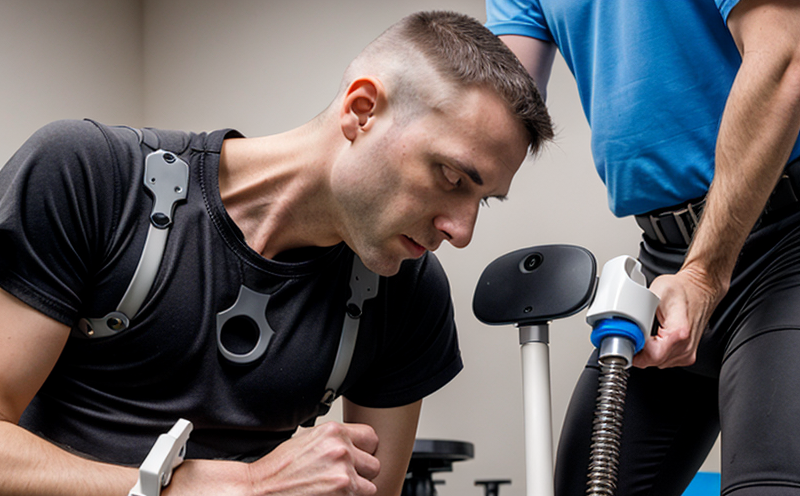ASTM F2977 Shoulder Prosthesis Wear Testing
The ASTM F2977 standard specifies a method for wear testing of shoulder prostheses. This is crucial for ensuring the longevity and performance of shoulder replacements, which play a vital role in restoring mobility and function to patients undergoing total shoulder arthroplasty (TSAR). The test involves simulating the natural movement patterns of the shoulder joint under controlled conditions that mimic real-life usage.
The testing procedure is designed to evaluate the wear characteristics of the articulating surfaces of the prosthesis, which are typically made from materials such as highly cross-linked polyethylene (HXLPE) or ultra-high molecular weight polyethylene (UHMWPE). The primary goal is to assess how these materials withstand friction and abrasion over time. This ensures that the prosthetic components do not degrade rapidly, leading to complications like pain, instability, or failure of the device.
The testing apparatus used for ASTM F2977 includes a specialized wear tester capable of simulating shoulder joint motion with controlled loads, lubrication conditions, and environmental factors. The test protocol typically involves multiple cycles that replicate the range of motion in a patient's shoulder during typical daily activities. This comprehensive approach helps to identify potential issues early on, allowing manufacturers and clinicians to refine designs for improved performance.
The acceptance criteria for this test are stringent and ensure that the prosthetic components meet or exceed regulatory standards for safety and efficacy. Compliance with ASTM F2977 is essential for medical device manufacturers aiming to gain market approval in regions where these standards are mandatory. By adhering to these protocols, healthcare providers can have confidence in the quality of the devices they use, knowing they have been rigorously tested to withstand real-world conditions.
Real-world applications of ASTM F2977 testing include:
| Applied Standards | Description |
|---|---|
| ASTM F2977-18 | The standard test method for wear of shoulder prosthesis components. |
| ISO 14243:2015 | International standard for orthopedic implants, including wear testing methods. |
The use of ASTM F2977 in conjunction with other international standards ensures a robust and consistent approach to evaluating the performance of shoulder prostheses. This comprehensive methodology helps manufacturers develop products that not only meet regulatory requirements but also provide long-term benefits for patients.
Applied Standards
| Standard | Description |
|---|---|
| ASTM F2977-18 | The standard test method for wear of shoulder prosthesis components. |
| ISO 14243:2015 | International standard for orthopedic implants, including wear testing methods. |
Eurolab Advantages
Eurolab offers unparalleled expertise in ASTM F2977 shoulder prosthesis wear testing, leveraging state-of-the-art facilities and experienced professionals to provide accurate and reliable test results. Our laboratory is equipped with the latest equipment designed specifically for this type of testing, ensuring that each specimen undergoes conditions as close to real-life usage as possible.
Our team of engineers and technicians has extensive experience in orthopedic device testing, allowing us to offer detailed analysis and comprehensive reports that meet or exceed customer expectations. We understand the importance of precision in medical device testing and are committed to delivering high-quality results every time. This commitment is reflected in our ISO/IEC 17025 accreditation, which ensures that we adhere to international standards for laboratory testing.
Eurolab’s advanced instrumentation allows us to simulate a wide range of test conditions, including different lubrication types and environmental factors. We can also customize tests to meet specific client requirements, ensuring that our clients receive the most relevant data possible. Our approach is not only about compliance but also about providing actionable insights that can drive product improvements and enhance patient outcomes.
Our customers benefit from Eurolab’s deep understanding of ASTM F2977 testing protocols, as well as our commitment to continuous improvement in our methods and facilities. This ensures that we remain at the forefront of orthopedic device testing, providing reliable data that can be trusted by regulatory bodies and healthcare providers worldwide.
Quality and Reliability Assurance
Eurolab is dedicated to maintaining the highest standards in quality and reliability assurance. Our laboratory adheres strictly to ISO/IEC 17025 accreditation, ensuring that all our testing procedures are conducted with precision and accuracy. This commitment extends beyond just meeting regulatory requirements; it also involves providing detailed insights into each test result so that manufacturers can make informed decisions about their products.
We employ rigorous quality control measures to ensure consistency across all tests performed in our facility. These include regular calibration of equipment, training of personnel on the latest testing techniques, and strict adherence to established protocols. By doing so, we maintain a high level of accuracy and repeatability in every test conducted here.
In addition to these internal controls, Eurolab also participates actively in interlaboratory comparisons organized by reputable organizations such as ASTM International. These exercises help validate our testing capabilities against those of other leading labs around the world. Through participation in these programs, we can further refine our processes and ensure that they continue to meet the evolving needs of the medical device industry.
The combination of strict adherence to international standards like ASTM F2977-18 and ongoing efforts towards quality improvement enables Eurolab to deliver consistent and reliable results. Our clients can be confident knowing that every test performed at our facility meets the highest levels of accuracy and integrity, thereby supporting their goals for product development and regulatory compliance.





